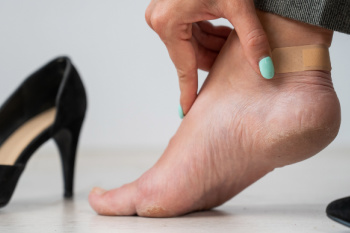Connect With Us
Blog
How Wearing High Heels Affects Your Feet

Wearing high heels can lead to significant heel and ankle pain due to the unnatural positioning of the foot. High heels shift your body weight forward, putting extra pressure on the toes, ball of the foot, and heel. Over time, this can lead to conditions like plantar fasciitis, Achilles tendonitis, or ankle sprains. The prolonged stress on the foot's arch and the ankle can also cause discomfort and swelling. The causes of heel and ankle pain from high heels include improper alignment, muscle strain, and pressure on the sensitive structures of the foot. Wearing heels that are too high, too tight, or lack proper cushioning can worsen these issues. Treatment often includes rest, stretching, and wearing supportive shoes. A podiatrist can provide tailored recommendations, such as custom orthotics, targeted exercises, or advice on choosing shoes that protect your feet. If you are experiencing heel or ankle pain from high heels, it is suggested that you schedule an appointment with a podiatrist.
High heels have a history of causing foot and ankle problems. If you have any concerns about your feet or ankles, contact one of our podiatrists from Community Foot Specialists. Our doctors can provide the care you need to keep you pain-free and on your feet.
Effects of High Heels on the Feet
High heels are popular shoes among women because of their many styles and societal appeal. Despite this, high heels can still cause many health problems if worn too frequently.
Which Parts of My Body Will Be Affected by High Heels?
- Ankle Joints
- Achilles Tendon – May shorten and stiffen with prolonged wear
- Balls of the Feet
- Knees – Heels cause the knees to bend constantly, creating stress on them
- Back – They decrease the spine’s ability to absorb shock, which may lead to back pain. The vertebrae of the lower back may compress.
What Kinds of Foot Problems Can Develop from Wearing High Heels?
- Corns
- Calluses
- Hammertoe
- Bunions
- Morton’s Neuroma
- Plantar Fasciitis
How Can I Still Wear High Heels and Maintain Foot Health?
If you want to wear high heeled shoes, make sure that you are not wearing them every day, as this will help prevent long term physical problems. Try wearing thicker heels as opposed to stilettos to distribute weight more evenly across the feet. Always make sure you are wearing the proper shoes for the right occasion, such as sneakers for exercising. If you walk to work, try carrying your heels with you and changing into them once you arrive at work. Adding inserts to your heels can help cushion your feet and absorb shock. Full foot inserts or metatarsal pads are available.
If you have any questions please feel free to contact our offices located in Beavercreek, Dayton, and Vandalia, OH . We offer the newest diagnostic and treatment technologies for all your foot and ankle needs.
